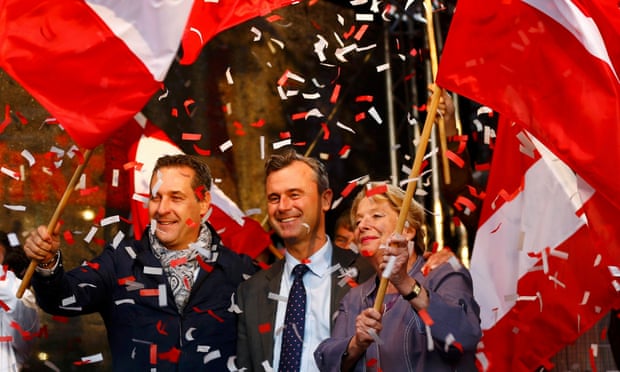Frustrated voters could hand the country’s presidency to the populist Norbert Hofer on Sunday after rejecting the major parties
Left to right: Freedom party leader Heinz-Christian Strache, candidate Norbert Hofer and party member Ursula Stenzel attend Hofer’s final rally in Vienna on 20 May
Anyone who wants a glimpse of what kind of country Austria might turn into after this weekend’s presidential elections could do worse than visit the town of Wels in Upper Austria.
A majority vote tonight for Norbert Hofer of the Freedom Party (FPO) would not only confront the EU with a far-right president in its midst for the first time, but could send Austria on a journey towards becoming an autocratic, illiberal state more akin to Viktor Orbán’s Hungary than Angela Merkel’s Germany.
There are fears that Hofer could use the instruments of the president’s office – previously interpreted as a mainly ceremonial role by the centrist politicians who have held the post in the past – to dissolve the government and usher in a chancellor from his own party, which is currently leading in the polls. In a TV debate, Hofer ominously said: “You will be surprised what can be done [by a president].”
In Wels, a community of 60,000 that was a capital city in the days of the Roman empire, the nightmare of Austrian liberals has already become a reality. A stronghold of the social democratic SPO party since the end of the second world war, the city elected its first rightwing mayor last year. In last month’s first round of the presidential election, 39% of Welsians voted for the rightwing Hofer, four percentage points more than voted for the right in the country as a whole.
The town’s new mayor, Andreas Rabl, has an appeal similar to that of the presidential candidate: a youthful, 44-year-old lawyer with a penchant for bright blue socks, he looks and sounds nothing like the beer hall rabble-rousers who have previously dominated the party in the regions. Rabl even owns a collection of paintings by the Viennese actionist painter Hermann Nitsch – an artist so lacking in folksy Alpine appeal that the Freedom party in Lower Austria has been trying to close down a museum dedicated to his work.
When the Freedom party last rose to prominence, entering government under its late leader, Jörg Haider, in 2000, it was still firmly rooted in Carinthia, in the deep rural south. Under the party’s current leader, Heinz-Christian Strache, and Hofer, who is one of Strache’s close allies, the FPO has expanded, managing to win voters both in Vienna’s working-class districts and more bourgeois areas such as the Wels town centre.
The party has tried to shed memories of its antisemitic history, with Strache and Hofer repeatedly paying visits to Israel. Instead, the Freedom party has focused on an anti-Islam, anti-refugee message. “Islamism is the new fascism,” Strache has said.
Yet once in office the party draws from a more conventional rightwing playbook. In Wels, which has a proportionally higher migrant population than other parts of Austria, Rabl has introduced a “value codex” for nurseries, which prescribes that children aged four to six should be able to recite by heart five German-language poems and five songs. Migrants who refuse to send their children to nursery face cuts in benefits.
At the same time, Rabl has vouched to cut down the operational deficit of his social democrat predecessors, promising to save the city 40m euros per year. The Alter Schlachthof, a cultural centre with a youth club and a workshop for women which are used by many of the town’s minorities, faces a 10% cut in its budget. One of the eight youth worker jobs has been cut.
His proudest achievement is hard to miss. The annual maypole has been moved from a corner next to the town hall into the centre of the town square. Its raising was celebrated with a festival, including a dance by performers in dirndls and lederhosen.
The global rise of a new populist right – from America’s Donald Trump via France’s Marine Le Pen to Britain’s Brexit campaign – is often attributed in part to a fear of globalisation and its symptoms, from migration movements to increased job insecurity. At a political debate at Vienna’s Burgtheater last Tuesday, journalist Barbara Coudenhove-Kalergi suggested that “we in the arts have only benefited from globalisation. Yet, if an electrician is worried about an Afghan or a Syrian taking his job, he may have a point.”
MORE HERE

